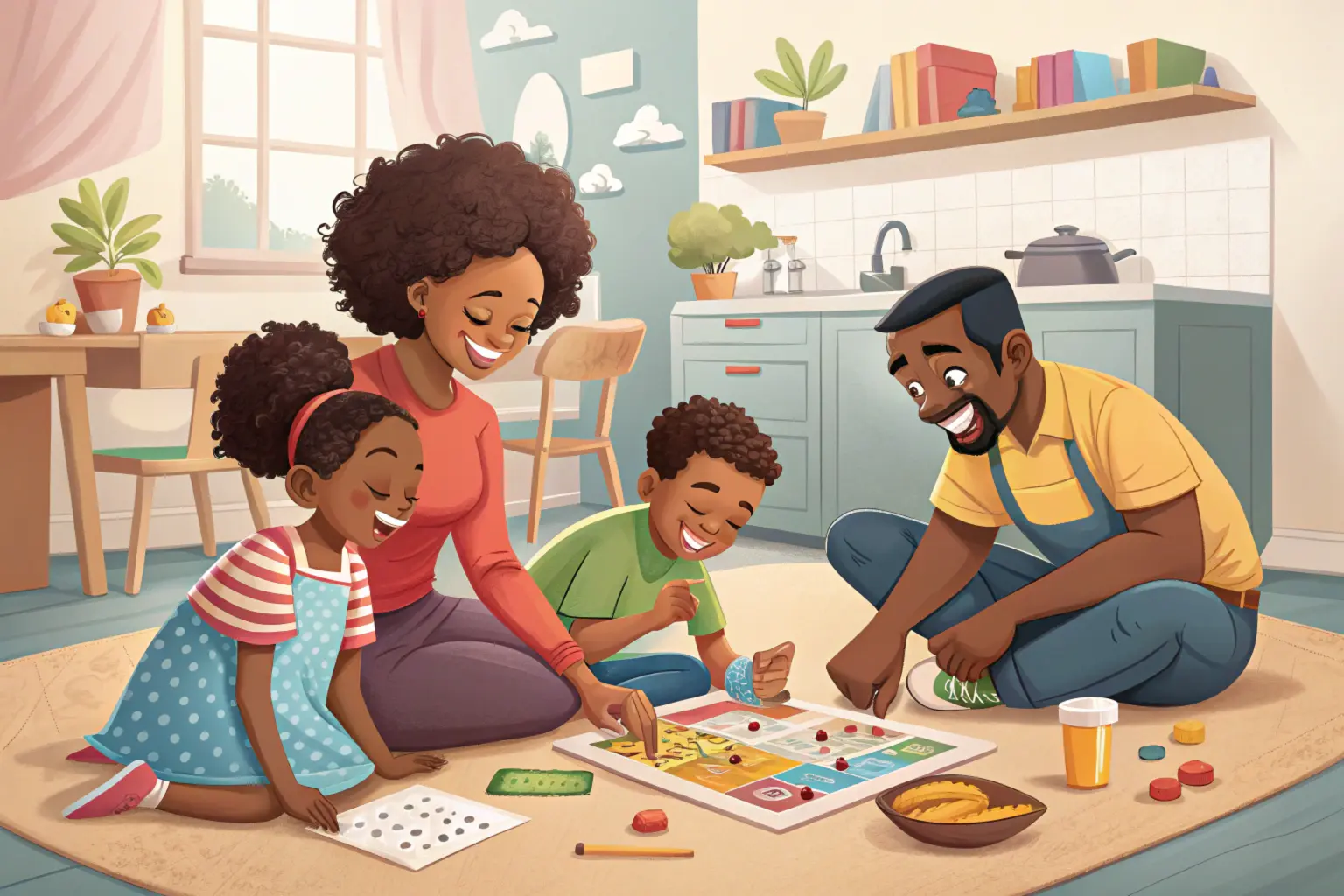[ad_1]
In today’s fast-paced world, the notion of a “modern nuclear family” has evolved tremendously. Gone are the days when families were defined strictly as a mom, dad, and children living under one roof. Now, our families can include step-parents, single-parent households, and even cohabiting partners raising kids together. As a parent, you may feel overwhelmed trying to navigate these changing dynamics, wishing for a better understanding of how to adapt and thrive in an evolving family landscape.
In this article, we’ll explore the concept of the modern nuclear family, highlighting the importance of embracing change in family dynamics. You’ll discover practical strategies to enhance connections among family members while overcoming common challenges. With insights from experts and real-life anecdotes, you’re bound to find actionable tips that resonate with your family’s unique situation.
Understanding the Basics of The Modern Nuclear Family
At its core, the modern nuclear family encompasses any family structure that emphasizes the bond between parents and their children, regardless of how that family is composed. This might involve traditional two-parent families, single-parent households, or blended families made up of step-siblings and parents. The term encourages a more inclusive understanding of how families can function successfully.
The importance of embracing the modern nuclear family format lies in its ability to provide a nurturing, supportive environment tailored to meet kids’ diverse needs. In fact, studies show that children from non-traditional family structures can perform just as well academically and socially when supported by loving parents. Understanding that family dynamics are not one-size-fits-all helps alleviate the pressure you might feel to conform to societal expectations.
Key Benefits of The Modern Nuclear Family for Parents and Children
-
- Flexibility and Adaptability: A modern nuclear family structure allows for more customized approaches to parenting. Whether it’s working from home during the pandemic or co-parenting with an ex, flexibility results in better adjustments to changing lifestyles.
-
- Diverse Role Models: With blended families or single-parent arrangements, children are exposed to a wide range of role models, teaching them to respect and appreciate various perspectives. Multiple caregivers can introduce them to different values and life skills.
-
- Enhanced Communication Skills: Families that embrace change often develop robust communication practices. When you openly discuss challenges and differences, you equip your children with the tools to express themselves and resolve conflicts effectively.
-
- Resilience: By navigating the realities of a modern nuclear family, you and your kids learn resilience. This important life skill helps everyone cope with adversity and adapt to new situations, making them better equipped for life’s changes.
-
- Stronger Bonds: The intentionality behind building connections within a non-traditional family structure can lead to stronger emotional connections. As you work together toward common goals, such as family traditions or activities, you’re forging deeper relationships that last a lifetime.
Common Challenges with The Modern Nuclear Family and How to Overcome Them

Despite the numerous benefits, the modern nuclear family presents challenges that require both understanding and effort.
-
- Role Confusion: Blended families, for example, may lead to confusion regarding parental roles. To address this, establish clear expectations about who handles certain responsibilities. Creating a family “job chart” can help visualize roles and responsibilities.
-
- Navigating Differences: In families with diverse backgrounds, conflicts may arise due to differing values or parenting styles. Open conversations about expectations and values can foster understanding. Schedule regular family meetings to discuss issues and make decisions together.
-
- Feeling Isolated: With changing family structures, parents might feel alone in their experiences. Seek out parenting groups, online forums, or local support networks to connect with others who are navigating similar family dynamics.
-
- Balancing Time: Juggling work and family time can feel daunting. Consider implementing a family calendar to keep track of everyone’s schedules. Designate dedicated family nights each week for bonding, ensuring quality time together.
Expert-Recommended The Modern Nuclear Family Strategies
-
- Practice Intentional Communication: Make a habit of openly discussing family matters. Encourage your family to express feelings and ask questions. You might try having “check-in” conversations at the end of each day to stay connected.
-
- Build Family Traditions: Create unique rituals that resonate with your family’s identity. Whether it’s Friday night pizza or Sunday morning hikes, traditions foster a sense of belonging.
-
- Incorporate Technology Wisely: Use technology to your advantage. Group chats, video calls, and family apps can help everyone stay connected, especially in blended families or separated situations.
-
- Set Boundaries with Extended Family: It’s essential to set clear boundaries regarding how extended family interacts with your immediate family. Discuss collectively how to handle visits, holidays, or traditions to promote harmony.
-
- Support Each Other’s Friendships: Encourage your children to cultivate friendships outside of family life. Understanding the importance of socialization with peers fosters emotional growth and independence.
-
- Promote Equality: Discuss gender roles and diversity openly, promoting understanding of equality among siblings or non-traditional family structures. Teaching children about acceptance allows them to grow into empathetic adults.
Essential The Modern Nuclear Family Tips for Different Age Groups
-
- Toddlers and Preschoolers: Keep communication simple. Use visuals and storytelling to help them understand their family dynamics. Reinforce the idea that all families are unique.
-
- Elementary Age: Involve your kids in discussions about family roles. Encourage them to share their thoughts on their needs and how everyone can contribute, promoting teamwork.
-
- Tweens: As they navigate friendships and peer influences, promote an open dialogue about family relationships while discussing conflicts they might observe among friends’ families.
-
- Teens: Encourage self-expression and independence. Help them understand their identity within the family framework while fostering conversations about their values and friendships.
Making The Modern Nuclear Family Work for Your Family
To find personalized adaptation strategies, start by identifying your family’s unique needs and values. Take the time to understand what makes your family thrive. Consider conducting a family survey to gather input on activities or habits that everyone enjoys.
Additionally, remain patient as you navigate change. When faced with challenging transitions, dedicate time to assess what strategies are working and what might need to be adjusted. It’s okay to establish new routines that work for your family while ensuring everyone feels heard.
When to Seek Professional Help with The Modern Nuclear Family
While many families manage to navigate these changes successfully, sometimes the challenges may feel insurmountable. Signs that indicate you might want to seek professional help include:
-
- Persistent conflict that can’t be resolved through communication.
-
- Feelings of isolation or frustration among family members.
-
- Behavioral issues in children that appear linked to family dynamics.
-
- General feelings of confusion about parenting roles or expectations.
If you observe these signs, consider consulting a family therapist or counselor who specializes in family dynamics. Resources like the American Psychological Association can also provide valuable insights and referrals.
Final Thoughts on The Modern Nuclear Family
Embracing the modern nuclear family is all about recognizing the beauty of diverse family structures and how they can lead to unique benefits. By fostering communication, creating family traditions, and being adaptable, you can cultivate a loving home environment that thrives on connection and mutual respect.
In conclusion, don’t be afraid to adapt and embrace change in your family dynamics. Take the time to understand your family’s needs, overcome challenges together, and find joy in the journey. The modern nuclear family is a celebration of love, support, and resilience. And remember—you’re not alone on this journey. You’ve got this!
By harnessing the insights shared in this article, take the next steps to enhance your family’s bond. Why not sit down this week and start having those important conversations? Your family can flourish in the modern landscape of parenting, today and into the future.
[ad_2]


